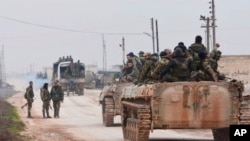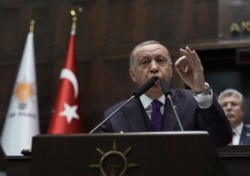The Syrian army is advancing on Idlib, the last rebel enclave, in the face of renewed Turkish military threats. But with the looming danger of confrontation, Ankara is facing increasing international and domestic pressure to change its stance towards Damascus.
With the capture of the rebel town of Saraqeb, Damascus forces are tightening their grip on Idlib. The town fell after heavy fighting and Ankara's warnings to Damascus to end its military offensive.
Turkish forces have four military observation posts around Saraqeb. The posts are part of a 2018 agreement struck between Ankara and Moscow to create a de-escalation zone in Idlib to prevent clashes between rebel and government forces.
The Turkish army is now facing off against the Syrian army. "Any military aggression targeting Turkey's security and Turkish soldiers will be severely punished," Turkey's U.N. ambassador, Feridun Sinirlioglu, said Thursday. "We will never hesitate to use our right to self defense. I am not drawing a red line here. This is a warning."
Ankara is ruling out withdrawing from the posts. But analysts warn Turkish forces are facing an increasingly untenable position.
"In the field, the Russians still control the Syrian airspace; Turkey can't undertake any air operations. And if Turkey cannot do this, it's far fetched that the Turkish army can control the situation there," said international relations professor Huseyin Bagci of Ankara's Middle East Technical University.
"The Turkish army has certain capabilities, no doubt about it. But Idlib is getting lost to the [Syrian] government forces in the long run because of Russian support, and with Russian support, success is guaranteed," added Bagci.
Erdogan is also facing growing domestic pressure to change its stance. Tuesday, Kemal Kilicdaroglu, the leader of Turkey's main opposition CHP, called for Erdogan to abandon the policy of Syrian regime change and stop supporting rebel forces. Kilicdarolgu also called for diplomacy to resolve the crisis in Idlib.
Ankara cut relations with Damascus at the onset of the civil war and is among the principal backers of the rebels. Analysts suggest such robust and costly support makes any reversal of policy difficult for Erdogan.
"Domestic concerns, of course, play an important role, “said Bagci "Because Erdogan engaged so strongly against (Syrian leader Bahar al-) Assad that he cannot talk to Assad directly. I see this as a big obstacle. He [Erdogan] is not in a position to start talks. But this insistence of not talking to government in Syria will create more troubles to Turkey."
But in January, Turkey's key spy chief, Hakan Fidan, met his Syrian counterpart, Major General Ali Mamlouk, head of the National Security Bureau. The meeting in Moscow was interpreted as a softening in Ankara's stance towards Damascus. However, the outcome of the meeting, some analysts suggest, means Ankara may have little to gain from any future talks.
"Hakan Fidan spoke to the Syria intelligence chief, and all he got was an ultimatum from Assad for all Turkish forces to quit Syria," said analyst Atilla Yesilada of Global Source Partners. "Why would he [Assad] make peace with Turkey? he has all the cards. the only peace with Assad is surrender."
But Moscow, which analysts say has influence over Damascus, is lobbying for normalization of Turkish-Syrian relations as part of a broader strategy of ending the civil war and stabilizing the Syrian regime.
High-level Turkish officials are set for talks with their Russian counterparts in Moscow to discuss Idlib. With Erdogan warning over a million Syrians have fled the latest fighting to Turkey's border, Ankara is warning of a humanitarian and security crisis.
With Turkey hosting over three-and-a-half-million Syrians from the civil war, Erdogan is warning Turkey cannot take any more. Analysts suggest the threat of a new exodus could strengthen Ankara's resolve to confront Damascus, if it continues its efforts to retake Idlib.
U.S. support for Ankara could add to Turkish resolve. "We're also very supportive of Turkey's efforts to shore up its line of [military] outposts. The Turks have a considerable number of troops in Idlib. These are our NATO allies. We want to be sure that nothing happens to them. We're watching that very closely," said U.S. Ambassador James Jeffrey, the U.S. special representative for Syria engagement and special envoy to the Global Coalition to Defeat ISIS.
However, Jeffreys appeared to rule out any military intervention. "We'll do everything we can short of major military operations to try to bring some sense to Moscow, to Tehran, and to Damascus," added Jeffreys Thursday during a State Department telephone briefing.
If the fighting in Idlib continues to escalate, precipitating a humanitarian crisis, analysts warn Ankara will be faced with two unwelcome choices. Either militarily confront Damascus or reverse policy and make peace with a government that, for the last few years, it has sought to overthrow.







